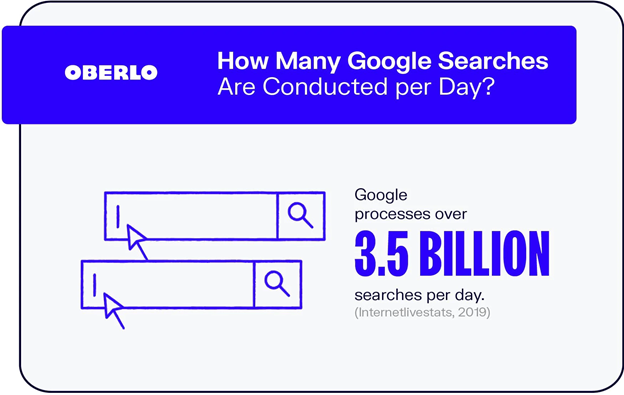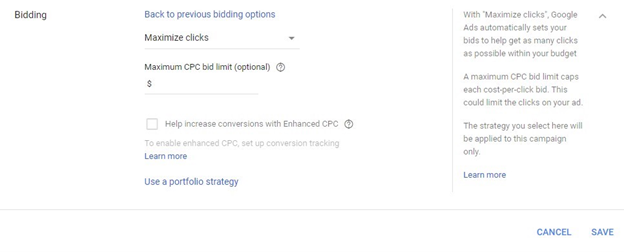Automated Bidding in Google Ads. Why should you use it?

Google ads have rapidly become one of the world’s most popular ways to reach online consumers, with over 3.5 billion Google searches taking place every day. But high popularity also leads to high competition. One factor that can play a role in getting your ads noticed ahead of the competition is automated bidding. So what is automated bidding? And how can it help enhance your PPC campaigns?
What is automated bidding and how does it work?
Automated bidding on Google is a term that covers a range of strategies where Google automatically adjusts bids based on a number of parameters. Automated bidding uses machine learning and data processing to establish indicators of searchers that may hint at a high likelihood of conversion. During periods of time where users are more likely to convert, automated bidding increases the bid to secure the most vital advertising spots. This helps to maximize conversion by getting the most from your budget in relation to your advertising goal.
You can currently use Google’s automated bidding system on Google Search Ads, Google Display Ads, Google Shopping ads, and Google App campaigns.
Campaign targets that allow you to use automated bidding
There are several ways to run an automated bidding campaign on Google. Each of these approaches has different uses. However, all of them will require regular attention and optimization. Otherwise, the campaign could go sideways without regular analysis of how it is going. Here are the campaign targets for automated bidding campaigns:
Target CPA
Target CPA stands for target cost per action. With this campaign target, you set a cost per action and Google automatically sets bids for you, with the aim being to get as many conversions as it can within the CPA you set. In this context, action is loosely the same as a conversion from any source. This could be anything from a sale, to a website visit.
Target CPA is generally used to lower the average cost per conversion for an advertiser. However, the success of that is largely down to well you can manage Google’s algorithm, and find the perfect target CPA for your ad.
Target Impression Share
This is the perfect campaign target if your main goal is brand awareness. That is because it solely focuses on getting your ads seen, and clicks have no impact. With target impression share, you set a goal in the form of a percentage. This percentage is the number of people you are aiming to reach out of all the available impressions. For example, a goal of 85% would aim to reach 85% of the total available impressions. Bids are automatically adjusted so that you are likely to appear in the area of the search page needed to reach your target impression share.
Target ROAS
Based on a similar premise to target CPA, target ROAS aims to consider the value of leads/sales and compare them against the advertising costs. This allows the algorithm to find valuable leads for the best price. The catch is, you have to set the target ROAS. Therefore, you need to have a decent background understanding of your target audience, and how much it will likely cost you to create a lead. Otherwise, you may end up with very few leads due to having an insufficient budget.
Like target impression share, target ROAS is also impressed in the form of a percentage, which is calculated by taking the value of a sale and dividing it by the amount spent to get that sale.
To use this option, you must have the value of sales reported back to your Google Ads account. Otherwise, it will not function properly.
Maximize Clicks
If your goal is simply to generate traffic to your site, this may be a good choice. Otherwise, it is not that effective. That is because the main aim of the maximize clicks campaign target is to automatically show ads to as many people who are likely to click on them as possible (within your budget). However, this doesn’t necessarily mean the people who click will convert. Maximize clicks is ideal for traffic-driven websites, but not as useful for those aiming to generate sales, downloads, or similar conversions.
Maximize Conversions
By maximizing conversions, Google automatically sets your bids to get the most conversions from your set budget. Unlike target ROAS, it focuses on the quantity of the conversions, rather than their quality.
Maximize Conversion Value
Maximize conversion value takes a lot of elements from the other campaign targets. This campaign target automatically sets your bids to get the most conversion value from your set budget. However, unlike target ROAS there is less room for budget adjustments. Maximize conversion value will always use the full extent of your budget.
When should you use automated bidding?
Automated bidding strategies can be a useful way to run Google campaigns, especially if you are generally low on time. However, you should only consider using this method when you have sufficient background data to analyze and implement the correct strategy. Otherwise, it is quite possible you will end up setting a campaign target that doesn’t really benefit your business.
Fortunately, you don’t have to have data for your entire campaign to start an automated bidding operation. This is because automated bidding can also be used at the ad group, or portfolio level, which allows you to operate on your chosen scale. This also allows you to specifically choose which parts of your advertising rely on automated bidding and focus on that area. Alternatively, you can choose campaign goals that are accessible with the current campaign data you have available to you.
When is it best to avoid automated bidding?
There are a few reasons why it may be best to avoid automated bidding for your Google ads campaign. The first of those is your budget, which automated bidding tends to use more of than you would if you used manual bidding instead.
Another time it is best to avoid automated bidding is when you do not have sufficient data for Google to run the campaign effectively. Running an automated bidding campaign with insufficient data could lead to expensive and undesirable results.
Last but not least, you should avoid automated bidding as a means of avoiding analysis on your campaigns. Automated bidding may save you time during the campaign, but that doesn’t mean you shouldn’t check and continue to analyze your campaign as you go. Without that analysis, the automated campaign can become wasteful with your funds, and your strategy incoherent.
Automated v Manual bidding
A general overview
Both automated and manual Google Ads campaigns have their benefits. Automated bidding ad campaigns are renowned for being time-saving, whereas manual bidding campaigns are much more in your control, allowing you to push your budget further. However, both types of bidding are also imperfect. Therefore, your choice of bidding for your campaign comes down to your taste, needs, and goals.
Many sellers choose to combine automated and manual bidding, in order to maximize the effectiveness of their campaign. This can be done by automated bidding within ad groups, rather than at the campaign level, to give you more control over the general direction of each campaign, and how much you spend per ad group.
Here are some of the main strengths and weaknesses of both automated and manual bidding campaigns, for you to compare and get the most from your campaign:
Automated bidding
+ Automated bid adjustments to suit the campaign targets saves you time as a merchant
+ Google has access to in-depth levels of data that are not available to merchants who use manual bidding
– With some campaign targets, bidding is uncapped. This means that you can easily spend your entire ad budget very quickly, and possibly less effective than you could manually.
– Running entirely on data and campaign goals means that automated bidding often doesn’t see the bigger picture, and simply follows dictated rules that may not always get the best results and uses the data it has. Insufficient data could cause campaigns to go off track and waste budget.
– There is a lack of control over specific keywords you bid on after selecting a campaign target
Manual bidding
+ Easy to grasp
+ Bids on keywords stay the same unless changed by the merchant
– Can be highly time-consuming and leave you with little time to adjust other important areas of your advertising campaign
– The task of constantly changing keyword bids can become tedious and tiresome quickly
– You can only use the data you are aware of to decipher campaign targets and choose keywords
Final thoughts
Google’s automated bidding can be a very useful tool. It can help you spot ad response emerging trends at a faster rate, and also give you the freedom to work on other vital parts of your campaign due to saving time. In turn, this helps to keep the essentials of your campaign goals on track. However, automated bidding should always be used responsibly. By this we mean you should try to monitor your automated bidding ads throughout your campaign, analyzing and optimizing frequently. By doing so, you will avoid wasting unnecessary ad budgets and get the most from your ads.






